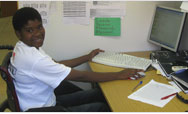|
example developing teaching materials. Students are participating in learning experiences such as planting and sorting school garden produce to be sold in the market to obtain funds for school improvement projects. They identify the nutritional value of various garden products, and develop marketing and distribution procedures to sell school garden products.
Results
Children and schools throughout Namibia have benefited greatly from the program. At the Bukalo Public School in Caprivi, a school garden planted by students and community members made a profit of almost $300 in 2003 from the sale of fruits and vegetables. In addition to students learning lessons about entrepreneurship and business management, scurvy is no longer a common affliction among students at the school due to the availability of the fresh produce. In Ondonga, an animal husbandry program was initiated at the local school from the donation of an ox, five goats, and twenty-six chickens. The Endola School in Ohangwena now has an HIV/AIDS Awareness Center with seventy-five registered members who are part of a home-based care team, an HIV/AIDS awareness choir group, and a counseling team
The Onathinge South Combined School developed learning materials, as part of of a regional inter-school competition, which were considered eligible for production and distribution at the national level by the Ministry of Basic Education, Sport and Culture. Given the serious lack of textbooks as well as
supplementary learning and teaching aids, the development of locally-produced teaching materials at the school level by both teachers and students has been strongly promoted by the Ministry.
Print-friendly version of this page (257kb - PDF)
|


